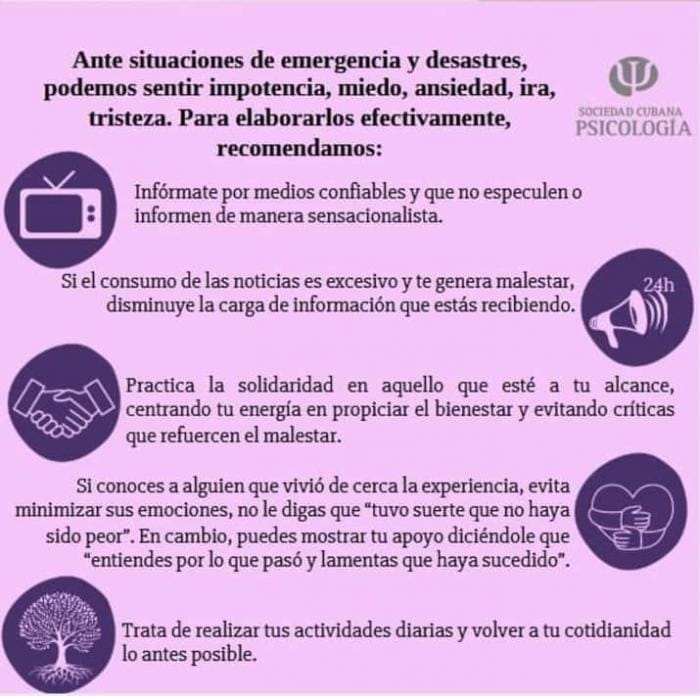
Psychological Help Group offers support to victims and family members of the Saratoga hotel incident
Through WhatsApp, the Psychological Help group, from the practice of Emergency Psychology, joins the support, guidance and accompaniment to the incident at the Saratoga Hotel.
To request services through the WhatsApp platform, please contact the psychologists and moderators of the group:
Niailé López +53 5 2843357
Caridad Zurita +53 52496338
Mabel Cedeño +53 53719723
Noharys Menéndez +5352513963
María Adela Añuez +53 5 8125210
The group Ayuda Psicológica ( Psychological Help) is a member of the Cuban Society of Psychology. For these difficult times, psychology is a more than necessary tool, reported Tribuna de La Habana.
In the networks, as they have done permanently during the pandemic, providing psychological guidance in a non-presential way, professionals of this science share some recommendations.
-Transmit short, simple messages, concrete words without being exaggerated or creating false expectations.
-When conversing personally or through alternative channels, favor people; express as much as possible their feelings, worries and fears. At the same time, assess priorities and their professional possibilities of care and support.
-Do not generate false expectations or false or unnecessary comfort.
-If you receive calls or you make them, do not follow rumors or other unofficial information. Not to generate or reinforce rumors
- In the population of children and young people, if possible, encourage them to talk and express their experiences. This can be done directly or indirectly through play, graphic expression: drawings, comics and games, among others.
- Prioritize the use and diffusion of elements of first aid and psychological first aid. Everything that favors the person, family or environment to regain self-control and self-esteem.
- To favor contacting loved ones and people who generate security and confidence.
- All this includes, of course, providing and accompanying members of First Response Teams and in other scenarios.
For children, professor and doctor Aurora García recommends:
- Be alert to the signals given by children in disaster situations, especially those who were impacted and live in the surrounding area.
- Fear or negative emotions can be expressed with symptoms such as hiding in furniture, closets, looking for protection; looking for the look or the face of family members or main caregivers and playing or drawing what they have experienced, something that allows them to channel their anguish.
- In view of this, it is advisable to try to respond calmly and without raising your voice to the children's questions or concerns and, as soon as possible, try to resume or maintain life routines.
- In the case of families with children and adolescents involved in or close to disaster situations, they indicate, it should be taken into account that these ages are very vulnerable and the family members responsible for their care or other caregivers should try to convey calm and security.
- In these cases, apart from responding with the truth without hiding or inventing false stories, it is necessary to transmit serenity and confidence, in addition to trying to resume the daily activities of these children and adolescents, and to show respect for their emotions.
- Families and caregivers should provide them with emotional support through hugs and, above all, respect their silence, since not all children and adolescents react in the same way to these situations.